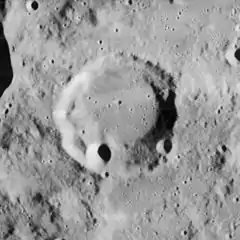Henry (lunar crater)
Henry is a lunar impact crater that is located to the northwest of the larger crater Cavendish, in the southeastern part of the Moon's near side. It was named after the Scottish-American scientist Joseph Henry.[1] Less than a half diameter to the northwest is similar-sized crater Henry Frères, named for the brothers Paul and Prosper Henry.
 Lunar Orbiter 4 image | |
| Coordinates | 24.0°S 56.8°W |
|---|---|
| Diameter | 41 km |
| Depth | 2.63 km |
| Colongitude | 57° at sunrise |
| Eponym | Joseph Henry |
The outer rim of Henry has undergone some impact erosion, particularly in the south and southeast where it is overlain by a pair of small craters. The former crater lies along the inner wall and part of the interior floor, with a rampart ridge to the north. The rim bulges outward slightly between these two depressions, and there are slight outward bulges to the north and northeast. The interior floor is relatively featureless, with an albedo that matches the surrounding terrain. A ray from Byrgius A, a satellite of Byrgius, crosses the northern half of the crater from west to east-northeast.
Satellite craters
By convention these features are identified on lunar maps by placing the letter on the side of the crater midpoint that is closest to Henry.
| Henry | Latitude | Longitude | Diameter |
|---|---|---|---|
| A | 24.5° S | 57.1° W | 8 km |
| B | 24.3° S | 56.3° W | 5 km |
| D | 24.9° S | 59.1° W | 7 km |
| J | 22.8° S | 55.4° W | 5 km |
| K | 23.2° S | 55.5° W | 6 km |
| L | 25.5° S | 57.4° W | 6 km |
| M | 25.8° S | 57.6° W | 13 km |
| N | 26.1° S | 58.3° W | 9 km |
| P | 25.8° S | 59.0° W | 6 km |
References
| Wikimedia Commons has media related to Henry (crater). |
- "Henry (lunar crater)". Gazetteer of Planetary Nomenclature. USGS Astrogeology Research Program.
- Andersson, L. E.; Whitaker, E. A. (1982). NASA Catalogue of Lunar Nomenclature. NASA RP-1097.CS1 maint: ref=harv (link)
- Bussey, B.; Spudis, P. (2004). The Clementine Atlas of the Moon. New York: Cambridge University Press. ISBN 978-0-521-81528-4.CS1 maint: ref=harv (link)
- Cocks, Elijah E.; Cocks, Josiah C. (1995). Who's Who on the Moon: A Biographical Dictionary of Lunar Nomenclature. Tudor Publishers. ISBN 978-0-936389-27-1.CS1 maint: ref=harv (link)
- McDowell, Jonathan (July 15, 2007). "Lunar Nomenclature". Jonathan's Space Report. Retrieved 2007-10-24.CS1 maint: ref=harv (link)
- Menzel, D. H.; Minnaert, M.; Levin, B.; Dollfus, A.; Bell, B. (1971). "Report on Lunar Nomenclature by the Working Group of Commission 17 of the IAU". Space Science Reviews. 12 (2): 136–186. Bibcode:1971SSRv...12..136M. doi:10.1007/BF00171763.CS1 maint: ref=harv (link)
- Moore, Patrick (2001). On the Moon. Sterling Publishing Co. ISBN 978-0-304-35469-6.CS1 maint: ref=harv (link)
- Price, Fred W. (1988). The Moon Observer's Handbook. Cambridge University Press. ISBN 978-0-521-33500-3.CS1 maint: ref=harv (link)
- Rükl, Antonín (1990). Atlas of the Moon. Kalmbach Books. ISBN 978-0-913135-17-4.CS1 maint: ref=harv (link)
- Webb, Rev. T. W. (1962). Celestial Objects for Common Telescopes (6th revised ed.). Dover. ISBN 978-0-486-20917-3.CS1 maint: ref=harv (link)
- Whitaker, Ewen A. (1999). Mapping and Naming the Moon. Cambridge University Press. ISBN 978-0-521-62248-6.CS1 maint: ref=harv (link)
- Wlasuk, Peter T. (2000). Observing the Moon. Springer. ISBN 978-1-85233-193-1.CS1 maint: ref=harv (link)